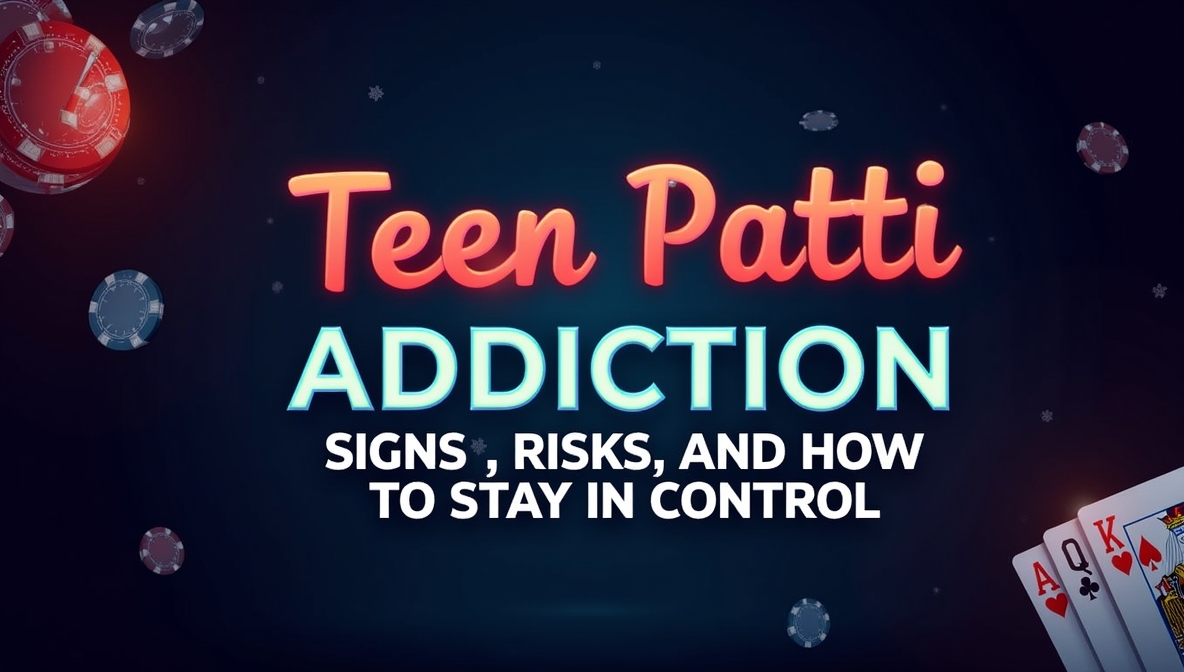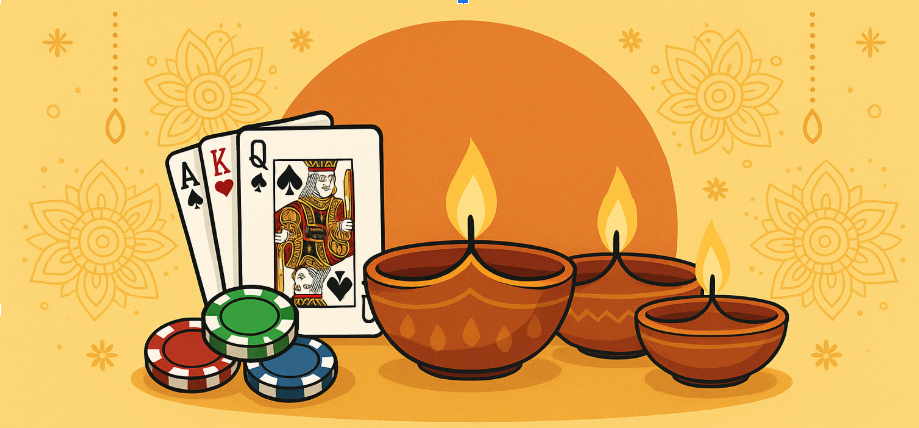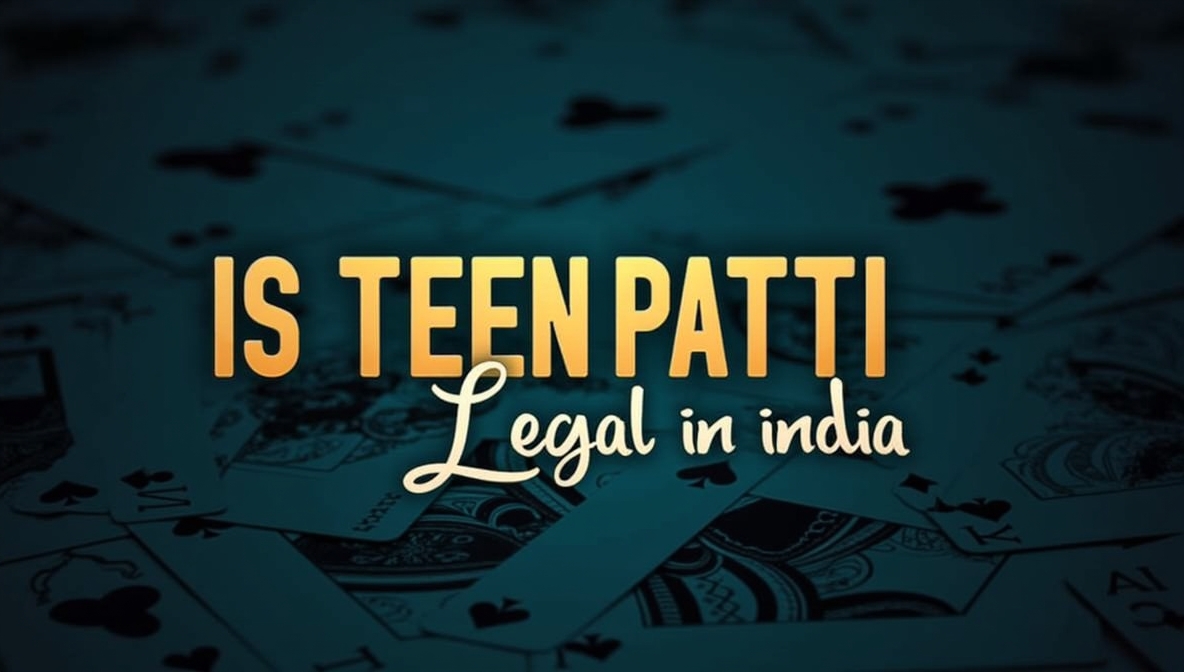Introduction
Teen Patti, often called the Indian Poker, is one of the most popular card games in India. While it is widely played during festivals like Diwali and is considered a fun pastime, the rapid growth of online Teen Patti apps has led to rising concerns about addiction, especially among youth and casual gamers.
Like any form of gambling, Teen Patti can quickly shift from entertainment to a dangerous habit. In this article, we’ll explore the signs of Teen Patti addiction, the risks involved, and practical steps to stay in control while enjoying the game responsibly.
What is Teen Patti?
Teen Patti is a three-card game traditionally played with real cards among friends and family. With the rise of smartphones, Teen Patti apps now allow players to gamble with real money, virtual coins, or both—anytime, anywhere. While this accessibility adds convenience, it also increases the risk of compulsive play.
Why Is Teen Patti Addictive?
Here are a few reasons why Teen Patti can be so addictive:
- Instant Gratification: Winning gives a quick dopamine hit, making you crave more.
- Easy Access: You can play 24/7 via apps, often with real money or rewards.
- Peer Pressure: Playing with friends or in social groups encourages competition.
- Virtual Rewards: Flashy visuals, bonus spins, and free coins keep users hooked.
- FOMO: Limited-time events and daily streaks encourage continuous engagement.
Common Signs of Teen Patti Addiction
Recognizing addiction early is the first step toward regaining control. Here are warning signs that someone may be addicted to Teen Patti:
1. Spending Excessive Time Playing
You find yourself playing for hours every day, often late into the night, ignoring responsibilities and relationships.
2. Ignoring Daily Tasks or Work
School, work, or household duties begin to suffer because of the time spent on the game.
3. Chasing Losses
Continuing to play in hopes of recovering lost money or coins, even after a losing streak.
4. Borrowing or Spending Excessively
Using savings, credit cards, or borrowing money to keep playing.
5. Mood Swings or Anxiety
Feeling restless, irritated, or anxious when not playing. Mood swings that depend on winning or losing.
6. Secrecy and Lying
Hiding the extent of your gameplay or lying to loved ones about how much time or money you’re spending.
7. Neglecting Physical and Mental Health
Skipping meals, losing sleep, or showing signs of stress, anxiety, or depression.
The Real Risks of Teen Patti Addiction
Addiction to Teen Patti, especially on online platforms, can have serious consequences:
1. Financial Problems
Spending beyond your means or falling into debt is a common outcome of gambling addiction.
2. Mental Health Issues
Guilt, anxiety, depression, and even suicidal thoughts can result from prolonged addiction.
3. Relationship Breakdown
Addiction often leads to conflict with family, friends, or partners due to neglect or financial strain.
4. Academic and Career Damage
Teenagers and young adults may lose focus on studies or work, harming their future prospects.
5. Legal Troubles
In some Indian states, online gambling may be restricted or illegal, leading to potential legal consequences.
Who Is Most at Risk?
Teen Patti addiction can affect anyone, but certain groups are more vulnerable:
- Teenagers and young adults
- People with a history of gambling or addiction
- Individuals experiencing stress, loneliness, or boredom
- Frequent users of online gaming or betting apps
- Low-income individuals hoping to “win big”
How to Stay in Control While Playing Teen Patti
Playing Teen Patti doesn’t have to be dangerous if you follow responsible gaming practices. Here are some steps to stay in control:
1. Set Time Limits
Restrict your playing time. Use phone timers or screen-time apps to prevent long sessions.
2. Set Spending Limits
Decide in advance how much money or virtual coins you’re willing to lose, and never exceed that amount.
3. Take Frequent Breaks
Avoid playing for hours on end. Step away from the game to relax, exercise, or spend time with others.
4. Avoid Chasing Losses
Losing is part of any card game. Don’t fall into the trap of trying to win back your losses—this often leads to more problems.
5. Never Play When You’re Emotional
Avoid playing when you’re sad, angry, or stressed. Emotional states can cloud judgment and increase risky behavior.
6. Don’t Use Real Money If You Can’t Afford It
Stick to free-play versions or games with virtual coins only. Avoid platforms that pressure you into real-money betting.
7. Stay Honest with Yourself and Others
Track your time and spending. Share your habits with someone you trust to keep yourself accountable.
Getting Help: What to Do If You’re Addicted
If you or someone you know is showing signs of Teen Patti addiction, here are immediate steps to take:
1. Talk About It
Speak openly with a friend or family member. Admitting the problem is the first step toward recovery.
2. Seek Professional Help
Counseling and therapy can help you understand the emotional and psychological triggers behind the addiction.
3. Use Self-Exclusion Tools
Many Teen Patti apps allow you to block or limit access to the platform. Use these tools to create digital boundaries.
4. Join a Support Group
Look for gambling support groups, both online and offline. Hearing others’ experiences can provide strength and insight.
5. Uninstall the App
Remove all gambling or betting apps from your phone and avoid websites that may tempt you to return.
Government and Legal Viewpoint in India
In India, gambling laws vary from state to state. While playing Teen Patti with friends during festivals is socially accepted, online Teen Patti with real money exists in a legal gray area. Some states like Telangana, Andhra Pradesh, and Tamil Nadu have imposed bans on online gambling apps.
There’s a growing push for regulating online gaming to protect users from addiction, scams, and underage gambling. As laws evolve, public awareness and personal responsibility become more crucial.
Conclusion
Teen Patti is a fun and culturally rich game, but like all games involving chance and money, it comes with risks. If not played responsibly, it can lead to serious personal, financial, and emotional harm.
The good news is that with awareness, boundaries, and support, you can enjoy the game without letting it control your life. Play for fun, not for fortune. And if you ever feel that the game is starting to take more than it gives—step back, reflect, and seek help.





